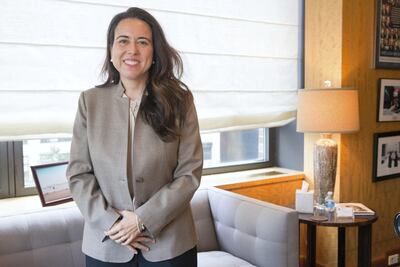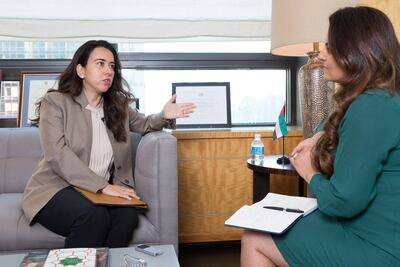The UAE is among the first countries to support the unlikely coming together of the UN secretary general Antonio Guterres and US president Donald Trump to reform the world body.
A high-level meeting on reforming the UN will be held today, on the eve of the start of the UN’s general debate.
Lana Nusseibeh, the UAE Envoy to the UN, said the meeting “is very important as many people feared the US would withdraw from the international stage, which was based on statements during the presidential elections”.
“However, what we are seeing is that the US push for a more efficient UN is in many ways giving the UN and the secretary general the momentum they need to get the change that everyone agrees has to happen,” Ms Nusseibeh said.
Speaking to The National in her office, which is a stone’s throw away from the UN building, she said: “The UN is more than a building and an ideology and a charter. It is a convening table where every member state has a voice and a say in the future of this world.”
Ms Nusseibeh voiced concern that in a “fragmenting and fragmented” world, “if this architecture breaks down in the coming period and on our watch, there is very little around to replace it. If the UN didn’t exist today, we know there wouldn’t be consensus to rebuild it”.
And so Ms Nusseibeh, who co-chaired a group to look into revitalising the General Assembly this year, says the UAE has put its full weight behind finding ways to making the UN “more nimble” to deliver on the challenges facing the world.

The UAE will have a non-permanent seat on the UN Security Council in 2022 to 2023, and is already planning its role in the council “and getting fit for the missions”.
It has also started a training programme for young Emirati diplomats to learn more about the workings of the UN.
And while Ms Nusseibeh spoke of the challenges to the international system, she said: “The good news is we have a new secretary general who we thoroughly support, who is very dynamic, who is a world leader in every sense of the word and who has a very ambitious reform agenda.”
This will be the first General Assembly for Antonio Guterres, who was appointed in January.
_______________
Read more:
UAE envoy urges reform of the United Nations
Reform takes centre stage at the UN as it faces up to its failings
UN General Assembly: Delegates and observers await Trump speech with bated breath
Eight kilometres (and a million miles) separate two takes on US-Islamic relations
In praise of the UN's imprecise goals
_______________
Ms Nusseibeh said that prevention was a key part of the reform agenda for the UN that the UAE supports.
“Instead of addressing all of these issues from the lens of ‘How do we tackle what has happened?’, he very much wants to gear the international UN system into, ‘How do we prevent this from happening in the first instance?’’’
Responding to a question about how the UN could be strengthened to face those countries that break international law, Ms Nusseibeh said: “This is a question we are all grappling with here as permanent representatives and UN staff, as everyone understands that the UN’s future as a valuable player is very much under question.
“The architecture of the Security Council was almost set up for failure on certain files.”
She explained that the five permanent members of the UN Security Council “do not necessarily reflect the balance of power as it is today”.
But she said the Secrurity Council was capable of action, as was witnessed on September 11, when the strongest sanctions against North Korea were passed.
“Reform of the UN writ large is desirable. We want more autonomy, more accountability, more responsibility from the UN and less of the centralised command structure we see with the Security Council.
“The most important part of any reforms would be to make the organisation more nimble and agile, and to reflect the global order today.”
Among the crises that “are breaking apart our region”, as Ms Nusseibeh refers to the many conflicts in our part of the world, she expects that there could be traction on Yemen and Libya, but was less optimistic on Syria.
As for Iran, the UAE sees the nuclear deal as “done”. Ms Nusseibeh said “our core concerns and interests are extended beyond the nuclear programme, and are very much around behaviour as an external actor in our region”.

She listed the areas of concern about Iran, stating some if its actions raise concerns about “whether it is breaking tenets of that agreement, like ballistic missile testing, behaviour in the region, support for illegal militia activity in the region and arms shipments to the Houthis in Yemen”.
She said that “what is of much concern are Iran’s nefarious activities in the region, which we don’t think contribute to its stability. That is our fundamental issue”.
Yemen is one issue that is of primary concern for the UAE, with both the political stalemate – as the Houthis have rejected UN overtures – and the humanitarian crisis.
This week, UN Envoy to Yemen Ismail Ould Cheikh Ahmed will be briefing the UN.
“We are very much supporting the envoy and the secretary general, who is trying to use his good offices to try to bring about a resolution,” Ms Nusseibeh said.
On Palestine, she said the UAE was “very, very supportive of the work of special co-ordinator for the Middle East peace process, Nikolai Mladinov” to implement some of the work the UN is trying to achieve.
The UAE is concerned about the funding problems facing UNRWA, the UN agency charged with overseeing support to Palestinians and particularly their education, to which the UAE is a big contributor.
The high level meetings at the UN come while the GCC is witnessing one of its worst crisis, with the Qatar row passing 100 days as Saudi Arabia, the UAE, Egypt and Bahrain continue their boycott of Doha over its support for extremists.
But Ms Nusseibeh said this issue would not dominate a busy UN week
“Qatar remains an important part of our region, is a member of the GCC and Arab League, but it has very disturbing definitions of what constitutes extremism in our region and I think collectively we don’t feel that the security of the region is being served by those disagreements over extremism and terrorism”.
The UAE’s envoy to the UN spoke with great energy about the UAE’s commitment to women’s empowerment, citing her role as the President of the UN Women Executive Board for 2017, while the UAE has been a member of this board since 2013, as it is one of the 20 top contributors to UN Women. Ambassador Nusseibeh said the UAE is serious about its commitment to empowering women ‘as we genuinely believe there cannot be successful and stable societies without the full participation of women in those societies, and we don’t just believe in that in our own context in the UAE but that is true around the world’. She described this commitment is ‘a very powerful tool in our foreign policy tool kit and part of how we project the UAE’s contribution to global issues here at the UN’. As part of this commitment, Shaikha Fatima bint Mubarak will be receiving a prize from UN Women for ‘her leadership role in the women peace and security agenda and for promoting women globally’. Noura AlSuwaidi, the director general of the Women’s Union will be coming to New York to receive the award, which Ambassador Nusseibeh described as ‘a big accolade’.

